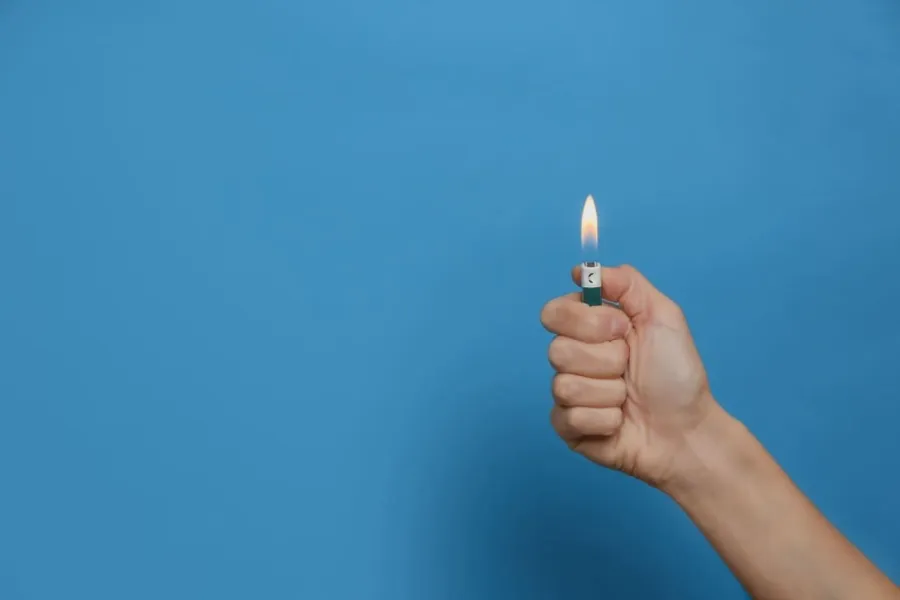Change language
Lighter on a plane: What you should know before traveling by plane
November 19, 2024

If you've ever wondered, Can you bring a lighter on a plane international? you're not alone. There's a common misconception that all lighters are banned from planes, but that's not entirely true.
Yes, you can indeed bring a lighter on a plane, but it's not as simple as it sounds. There are rules and regulations set by aviation authorities that need to be followed. So, before you pack your bags and hit the skies, let's burst the bubble of confusion around this topic!
Bringing a lighter on a plane. Yes, or No?
The answer is not as simple as a clear-cut „yes" or „no". Various factors come into play, such as the type of lighter, the airline's policies, and the regulations of the countries you are leaving from and arriving at.
Types of lighters
There are several types you can consider when packing for your flight. However, not all of them are permissible on an airplane:
- Arc Lighters - these are flameless and windproof, using plasma technology to produce heat. They are rechargeable and do not require any form of fuel.
- E-Lighters are electronic lighters that also do not need fuel but run on a battery. They are safe and environmentally friendly.
- Disposable lighters, as the name suggests, are meant for one-time use and can be easily carried in your pocket.
- The Zippo Lighters, a favorite among many, are windproof lighters that are refillable and come in various designs.
While these lighters are generally allowed, there are specific guidelines on how they should be carried, according to the Civil Aviation Authority (CAA) and the Transportation Security Administration (TSA).
The CAA and TSA have put forth distinct regulations defining the types of lighters allowed, the fuel they use, and where they can be carried. For instance, a common rule is that lighters with fuel are allowed in carry-on bags, while lighter fluid is prohibited. The exception is for disposable and Zippo lighters, which can be in checked luggage if properly stored in a DOT-approved case.
However, certain items are strictly prohibited from being carried onto a plane. Gun lighters, for example, are a no-go due to their resemblance to actual firearms. Lighter fluid is another big no-no as it's considered a hazardous material. Torch lighters, known for their hotter and more intense flame, are also not allowed.
How to carry a lighter when you are traveling by plane?
How many lighters can you bring on a plane? In general, you are allowed to take ONE lighter on your person onto a plane. However, the type of lighter matters, as we already discussed.
Thus, if you're planning to bring a lighter, you must ensure to carry it directly on your person, such as in your pocket, not in your carry-on or checked baggage. This rule is designed to prevent any accidental activation during the flight. Failure to comply with these regulations could lead to denied boarding compensation.
At airport security checkpoints, your lighter will be inspected. It's essential to remember that lighters should be placed in a transparent, secure, re-sealable bag separately from other liquids for easy inspection. This procedure is to ensure that the lighter does not contain any residual liquid fuel that could pose a risk during the flight.
Prior to travel, it's highly recommended to consult with your airline about their specific policies regarding lighters. Each airline may have slightly different rules, and by verifying these rules in advance, you can prevent unforeseen issues at the airport.
Are Zippo lighters allowed on the plane?
If you're a fan of Zippo lighters, your heart might sink when you hear that many airlines prohibit these items from being brought onto a plane. Zippo lighters are often classified as flammable items, which can pose a potential hazard during flights. The ban on Zippo lighters isn't a capricious rule, but an established guideline that many airlines strictly enforce for the safety of all passengers.
In particular, security authorities at German airports have classified Zippo lighters as potentially dangerous. Such classifications aren't made lightly. They underline the seriousness of the situation and highlight the potential risks associated with carrying such items on a plane. [1]
You can bring your lighter on a plane, but you can not smoke!
Smoking on planes isn't just frowned upon, it's illegal. Violating this rule can lead to severe consequences. It's not just about the unpleasant odor filling the cabin or the health risks associated with secondhand smoke. The potential for an in-flight fire poses a significant risk to the safety of all on board. Airlines have a zero-tolerance policy towards such unruly behavior. Offenders are likely to face hefty fines, immediate arrest, and the embarrassment of being escorted off the plane upon landing.
Some of you may wonder, if smoking is banned, why are there ashtrays in the lavatories of planes? This is a common misconception. The presence of ashtrays does not mean you can light up your cigarette in the loo. They are there for safety reasons. If a non-compliant passenger decides to smoke surreptitiously, the ashtray serves as the safest place to extinguish the cigarette and reduce the risk of fire.
Smoking was once a common sight on flights. In the 1970s, airlines even had `smoking sections'. However, several tragic incidents, including the 1973 crash of Varig Flight 820 that killed 123 people due to a fire started by a cigarette in a lavatory, led to the banning of inflight smoking. These tragedies serve as a stark reminder of why current policies are so strict. [2]
For those of you who carry a lighter for other reasons, such as for a camping trip during your layover, remember to double-check your lighter before you pack it!
What happens if you have a lighter in your suitcase?
So, you're thinking about packing a lighter in your suitcase for your next flight. This might seem like a minor detail, but it could potentially lead to serious consequences.
If a lighter is detected in your luggage during airport security checkpoint screenings, the security staff may take several actions. These could range from confiscating the lighter to requiring its removal from the luggage before boarding. In some cases, they may even allow the lighter to be carried on board as a non-baggage item.
However, this isn't a universal rule. Regulations regarding carrying lighters in luggage can vary significantly depending on both the airline you're flying with and the country you're flying to. To avoid any potential issues at security checkpoints and prevent any delays in your travel plans, check these specific regulations beforehand.
Rules for matches on aircraft
Typically, you are allowed to carry one small box of matches per person. The size of the box is subject to the approval of local airport staff, so it is advisable to keep the box small to avoid any complications.
The type of matches you carry also matters. The matches should not have an ignition head as they could be identified as dangerous substances. It is recommended to carry matches with red or brown heads. However, not all matches are allowed on a plane. For instance, `strike anywhere matches`, which can ignite on almost any surface, are prohibited. These matches can be identified by their blue or green heads.
Before you even reach your flight check-in, it is important to ensure that you don't have any potentially flammable items with you. Airlines have strict security measures to prevent fire risks on board. Therefore, preparation is key. Make sure you have properly identified and removed any potentially flammable items before checking in at the airport!
Remember, the key to a smooth journey is understanding and following the rules. So, before you head to the airport with your lighter, make sure you're well-informed and prepared. Safe travels!
Sources
[1] Office, Federal. “Lighters, Matches and Gas Burners.” Admin.ch, 2024, www.bazl.admin.ch/bazl/en/home/passagiere/passenger-luggage/feuerzeuge-und-streichhoelzer.html. Accessed 8 Nov. 2024.
[2] to, Contributors. “1973 Plane Crash of a Varig Boeing 707 in Saulx-Les-Chartreux, France.” Wikipedia.org, Wikimedia Foundation, Inc., 13 May 2006, en.wikipedia.org/wiki/Varig_Flight_820. Accessed 8 Nov. 2024.
More travel blog recommendations

Zamień opóźniony, odwołany lub przepełniony lot w odszkodowanie do 600 €!
Anulowano odszkodowanie za opóźniony lot
Zwrot pieniędzy za odwołany lot z opóźnieniem
Odszkodowanie za lot
©2026 AirClaim.com - Wszelkie prawa zastrzeżone Air Claim SA - Bdul. Pipera 1/Vi Bl. HYPERION TOWERS Et. 3 SP. BIR. 3 Cod 077190, Voluntari, Ilfov, Rumunia


















